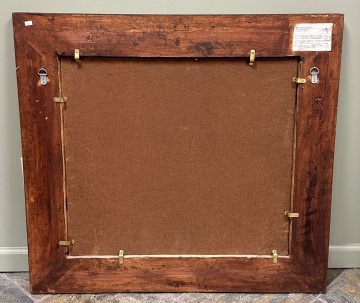Wilson Henry Irvine (American, 1869-1936), "Long Wharf and Tea Wharf, Boston Harbor"


Hammer Price w/ BP
$7,800
| Lot #: 163 Wilson Henry Irvine (American, 1869-1936), "Long Wharf and Tea Wharf, Boston Harbor" |
|
Oil on canvas laid on masonite. Signed 'Irvine' (lower right). |
| Ht. 24 x W 27 in. |
|
Provenance Greenwich Gallery, Greenwich Connecticut. Private Corporate Collection, Toronto, Canada. |
|
Condition No in-paint. |
|
Auction Date Sep 29, 2023 |
Details:
Catalogue Note: Long Wharf and Tea Wharf, Boston Harbor is an exceptional work by Irvine. This painting is one of the more sophisticated and delicately rendered works we have come across by the artist. The painting is of the T and Long Wharfs in the Boston Harbor. The T-wharf on the left-hand side of the moored New England fishing schooners is where the fish auctions were held. Upon the arrival and unloading of the fishermen's catch the bell tower would ring announcing that the fish auctions were about to commence. The pier on the right-hand side of the painting is Long Wharf Irvine once declared that his favorite type of day was to capture the hazy light. Those still, calm and peculiarly unusual days of even light that come with lazy summer days. This is surely an example of it.
Irvine began summering in OId Lyme in 1914. We feel that this is an early work dating from his earliest excursions to the area. It is potentially a view of Hambourg Cove where he often did his harbor views.
Irvine was born in Illinois and as a young man moved to Chicago, which is when he developed his interest in art. It was during this early period that he set upon depicting rural landscapes. It wasn't until Irvine married and had traveled to Europe and then returned that he settled in Old Lyme, Connecticut. He is considered one of the masters of American Impressionist landscape painting.
People were never important to Irvine and it is very rare to ever see a figure incorporated into his landscapes. Instead, his pictures are personal and are meant to create a view and world for the viewer alone. Irvine was a very experimental painter who was always trying to find new ways to interpret what he saw before him. At one point, he developed a technique that he termed "prismatic". It was based upon the same idea as looking through a glass prism, that affects what light does to the edge of what is being looked at.
Irvine began summering in OId Lyme in 1914. We feel that this is an early work dating from his earliest excursions to the area. It is potentially a view of Hambourg Cove where he often did his harbor views.
Irvine was born in Illinois and as a young man moved to Chicago, which is when he developed his interest in art. It was during this early period that he set upon depicting rural landscapes. It wasn't until Irvine married and had traveled to Europe and then returned that he settled in Old Lyme, Connecticut. He is considered one of the masters of American Impressionist landscape painting.
People were never important to Irvine and it is very rare to ever see a figure incorporated into his landscapes. Instead, his pictures are personal and are meant to create a view and world for the viewer alone. Irvine was a very experimental painter who was always trying to find new ways to interpret what he saw before him. At one point, he developed a technique that he termed "prismatic". It was based upon the same idea as looking through a glass prism, that affects what light does to the edge of what is being looked at.
Shipping Information:
Unlike many auction companies, Cottone Auctions offers a full-service shipping department. We’re equipped to pack and safely ship just about any item to just about any location around the globe.
Learn more >


